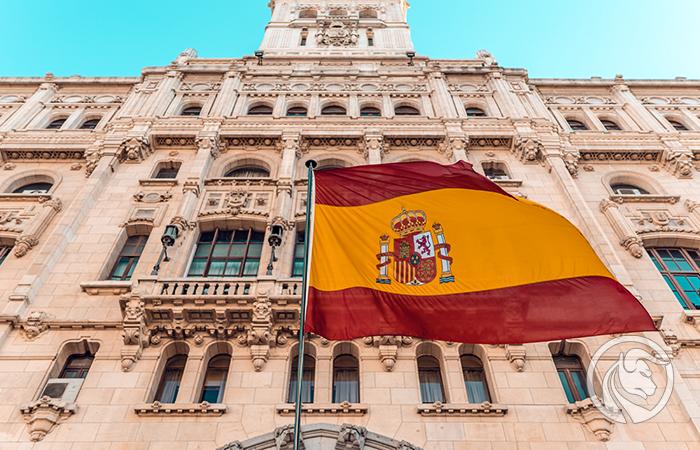Spain changes the law on cryptocurrencies. Another bum, like a ransom?
The Spanish government has started work on changing the law on cryptocurrencies. He wants to introduce records adapted to technological developments and monitor kryptowaluty as part of the fight against… drug smuggling. It has already been allocated for these activities "a dizzying amount" 100 thousand USD.
We like to make fun of Polish politicians, but as life shows, foreign governments also write sketches for themselves. The Spanish government has just announced the next phase of the fight against drugs. How to break supply chains? Can you close the borders? Catch corrupt customs officers? Buy specialized devices that will detect drugs? How about introducing undercover agents into smuggling and money laundering gangs? None of these things, just throw 100. USD to "cryptocurrency monitoring". If anyone even licked the topic blockchain technology and cryptocurrencies, he probably realizes that this is an amount that no serious person will even notice.
Spain is scared of cryptocurrencies
But it is not everything. The Spanish authorities also want to change the law to adapt it to technological developments. How has not yet been announced. The statements of politicians are the same generalities as "implementation of broad changes", "allowing courts flexibility", "defining the threats and sanctions that should be covered".
So it seems that Spanish politicians are scared of cryptocurrencies. Perhaps even the last one collapse of the FTX exchange, which resonated not only in the industry, but also hit mainstream headlines and news headlines. The narrative was obvious: Cryptocurrencies are a huge risk, and often (if not always) one big scam.
It is worth recalling here that 0,15% of cryptocurrency transactions are related to criminal activity, according to the January 2022 Chainalysis report. How many banking transactions are related to crime and money laundering? No one even estimated it.
– The new legal provisions in Spain are not against digital currencies. There is no question of introducing a ban on the use of cryptocurrencies - emphasizes Marcin Wituś, President of the Management Board of Geco Capital OU. – It is primarily about curbing illegal practices, which are also well known from the use of traditional currencies. The popularity of digital currencies is definitely growing and it is really hard to be surprised that they are also used by criminals. Every medal has two sides – adds Marcin Wituś.
Spain and cryptocurrencies
According to recent research, 76% of Spaniards have heard of cryptocurrencies, and 33% claim to know what regulations apply to them. In Poland, awareness is much greater. 90% of our compatriots have heard about cryptocurrencies, but 75% admit that they have only superficial knowledge about them.
Will there be another legal bubble?
Experts fear, however, that the announcements of changes will end up like many ideas of the Spanish government - a legal dud. The crowning and world-famous, crowning example of absurdity is, for example the right to seize someone's property.
If the so-called squats if they move into your house, e.g. during your holidays, and no one notices them there for 48 hours, they have the right to stay there! Removing them through the court often takes at least two years of legal battles. So this has led to the Spaniards hiring specialized companies for this purpose, which are nothing more than militias that remove such tenants by force. The most famous is founded in Barcelona FueraRansomwhich employs… heavyweight boxers. The service costs an average of 3-5 thousand. euros, but the company guarantees that it gets rid of squatters immediately. It is not entirely clear whether only from the apartment, or maybe completely from this world. If you do not want to have such problems, you need to hire a security company to guard the property in the absence of the owner. Holiday resorts are guarded almost entirely.
Will it be the same with cryptocurrency law? Time will tell.






















![Forex Club – Tax 9 – Settle tax on a foreign broker [Download the Application] Forex Club - Tax 9](https://forexclub.pl/wp-content/uploads/2024/02/Forex-Club-Podatek-9-184x120.jpg?v=1709046278)
![Trading View platform – solutions tailored to the needs of traders [Review] trading view review](https://forexclub.pl/wp-content/uploads/2024/03/trading-view-recenzja-184x120.jpg?v=1709558918)
![How to connect your FP Markets account to the Trading View platform [Guide] fp markets trading view](https://forexclub.pl/wp-content/uploads/2024/02/fp-markets-trading-view-184x120.jpg?v=1708677291)
![How to invest in ChatGPT and AI? Stocks and ETFs [Guide] how to invest in chatgpt and artificial intelligence](https://forexclub.pl/wp-content/uploads/2023/02/jak-inwestowac-w-chatgpt-i-sztuczna-inteligencje-184x120.jpg?v=1676364263)


![WeWork – the anatomy of the collapse of a company valued at $47 billion [WeWork, part II] wework bankruptcy story](https://forexclub.pl/wp-content/uploads/2024/04/wework-bankructwo-historia-184x120.jpg?v=1711729561)
![Adam Neumann – the man who screwed up Softbank [WeWork, part AND] adam neumann wework](https://forexclub.pl/wp-content/uploads/2024/04/adam-neumann-wework-184x120.jpg?v=1711728724)





![How to transfer shares to another brokerage office [Procedure description] how to transfer shares to another brokerage house](https://forexclub.pl/wp-content/uploads/2024/03/jak-przeniesc-akcje-do-innego-biura-maklerskiego-184x120.jpg?v=1709556924)

![The most common mistakes of a beginner trader - Mr Yogi [VIDEO] Scalping - The most common mistakes of a beginner trader - VIDEO](https://forexclub.pl/wp-content/uploads/2024/03/Scalping-Najczestsze-bledy-poczatkujacego-tradera-VIDEO-184x120.jpg?v=1711601376)
![Learning patience: No position is also a position - Mr Yogi [VIDEO] Scalping - Learning patience - No position is also a position - VIDEO](https://forexclub.pl/wp-content/uploads/2024/03/Scalping-Nauka-cierpliwosci-Brak-pozycji-to-tez-pozycja-VIDEO-184x120.jpg?v=1710999249)
![When to exit a position and how to minimize losses - Mr Yogi [VIDEO] Scalping - When to exit a position and how to minimize losses - VIDEO](https://forexclub.pl/wp-content/uploads/2024/03/Scalping-Kiedy-wyjsc-z-pozycji-i-jak-minimalizowac-straty-VIDEO-184x120.jpg?v=1710336731)















